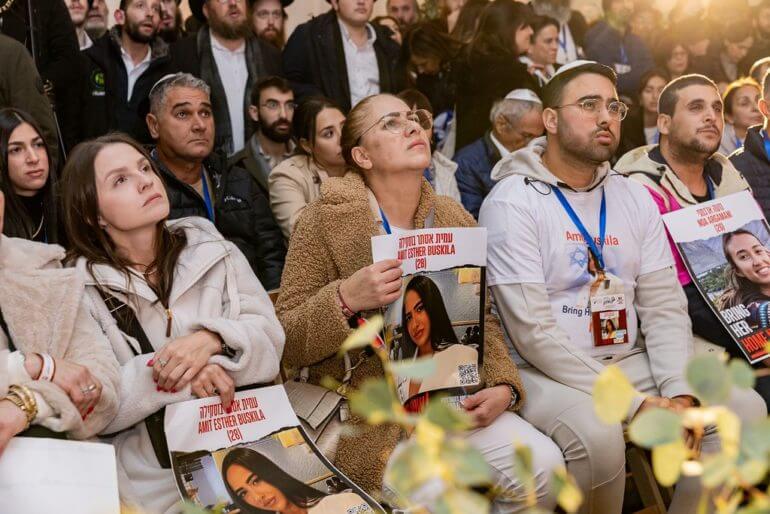
Does Freeing Hostages Take Precedence Over Other Mitzvot?
Dear Jew in the City,
Are there specific circumstances under which the mitzvah of freeing hostages takes precedence over other mitzvot?
Sincerely,
Aaron
Dear Aaron,
Thanks for your question. You want to know if the mitzvah of freeing hostages ever takes priority? It almost always takes priority!
The story of pidyon shvuyim (the mitzvah of redeeming captives) starts in Jeremiah 15:2. There, the prophet is told:
“[I]f they say to you, ‘Where shall we go?’ you shall say to them, ‘Thus says Hashem: those who are marked for death, to death; those who are for the sword, to the sword; those who are for famine, to famine; and those who are for captivity, to captivity.’”
The Talmudic Sage Rabbah bar Mari explains that this verse lists travails in the order of increasing harshness. A natural death is bad, but a violent death by the sword is worse. Death from starvation is worse still, and captivity is the worst of them all. This is because it incorporates aspects of all these other torments. Accordingly, the Talmud calls redeeming captives “a great mitzvah” (Baba Basra 8b).
The Rambam (Mishneh Torah, Hilchos Matnos Aniyim 8:10) explains that “Redeeming captives takes precedence over feeding and clothing the needy. In fact, there’s no mitzvah greater than redeeming captives because a captive is hungry, thirsty, unclothed and in mortal danger. One who ignores redeeming a captive violates the prohibitions against hardening our hearts and closing our hands (Deuteronomy 15:7), standing by idly when another’s life is endangered (Leviticus 19:16) and not oppressing someone with crushing labor (Leviticus 25:53). He also neglects the obligations to open our hands (Deut. 15:8), to enable our brethren to live with us (Deut. 19:18), to love our neighbors as ourselves (Lev. 19:18), to save those who are marked for death (Proverbs 24:11), and many other similar obligations. No mitzvah is as great as redeeming captives.”
Redeeming captives is so important that one may even sell a Torah scroll to raise the necessary funds (Tosfos Baba Basra 8b, s.v pidyon). While, optimally, a shul should not be sold for this purpose, it may be done if there’s no other recourse available (Mishnah Brurah 153:24).
And yet, there is a limit to the mitzvah of pidyon shvuyim. The Mishnah in Gittin (4:6), as part of a list of things done (or not done) for societal improvement (tikkun olam in its original context), teaches when we don’t redeem captives.
Basically, we don’t redeem captives when their captors are requesting too much. This is either because acquiescing would be disastrous for the community or because it would provide too great an incentive to take more people captive (Gittin 45a).
Let’s take the hostages currently being held in Gaza as an example. Imagine if Hamas asked for control of the Temple Mount. Or to release all the terrorists in Israeli prisons. Or just for Israel’s entire GDP. In any of those cases, Israel would have to decline. Those are scenarios the community just couldn’t live with (in some cases, literally).
There are factors to consider when negotiating ransom, such as if the captors threaten to execute the hostages or if they have kidnapped the leaders of our people. There’s also reason to extend extra effort to rescue children. Basically, every case is potentially different and must be treated as such.
Of course, there are likely to be differences of opinion as to what constitutes an excessive ransom. In one controversial example, the 1985 “Jibril exchange,” Israel traded 1,150 Palestinian prisoners for three captured Israeli soldiers. Rabbi Shlomo Goren (previously Chief Rabbi of the IDF and later, of Israel) thought that such a lopsided exchange posed a danger to the people. On the other hand, Rabbi Chaim David Halevi, Chief Rabbi of Tel Aviv-Yafo, considered the exchange to be appropriate based on the fact that national security depends on soldiers being confident that the country has their backs.
So, yes, pidyon shvuyim takes priority, but most of us won’t be called upon personally to redeem hostages. However, if you have the opportunity to contribute to such a cause, you should definitely prioritize it. The Shulchan Aruch says that every moment one delays redeeming a captive is as if one is spilling blood (Yoreh Deah 252:3).
You probably won’t be called upon to lead a commando raid in Gaza, it’s unlikely that you’ll have to arrange a hostage exchange, and you may not even be asked to donate. So what can you do? You can daven, and you can cry for the plight of our captive brothers and sisters. Prayer is a very powerful thing, but the Talmud tells us (Brachos 32b) that where prayers alone fail, heartfelt tears can succeed: “The gates of prayer may be closed, but the gates of tears are never closed.”
May Hashem speedily redeem our captives and return them to their families!
Sincerely,
Rabbi Jack Abramowitz
Educational Correspondent
Follow Ask Rabbi Jack on YouTube
If you found this content meaningful and want to help further our mission through our Keter, Makom, and Tikun branches, please consider becoming a Change Maker today.







